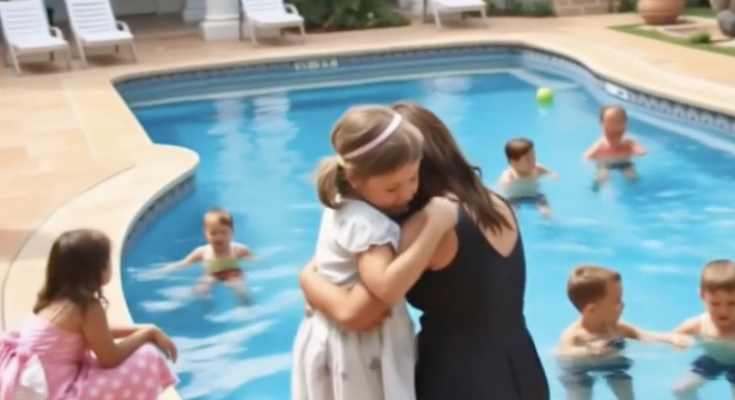“Ah, you’re here! I was just about to find you,” Susan replied, her voice overly cheery. But her eyes betrayed a flicker of something else—perhaps guilt or defensiveness.
“Why can’t Lily swim, Susan? She’s been looking forward to this all week,” I pressed, my voice steady but firm.
Susan hesitated, glancing around at the other parents who were now subtly tuning into our conversation. “Oh, it’s nothing personal,” she began, but I could sense the deflection coming. “I just thought it might be a bit overwhelming for her. You know, since she hasn’t taken formal swimming lessons like the other kids.”
I felt my blood boil. This was a flimsy excuse, and we both knew it. Lily swam like a fish, having spent countless summer days at our local community pool. This wasn’t about skill; this was about something else entirely.
“Susan, that’s not an excuse. Lily is perfectly capable of swimming. If you were genuinely concerned about her safety, you could have asked me,” I replied, trying to keep my voice calm for Lily’s sake, even as irritation simmered beneath the surface.
Lily stood beside me, her little hand clutching mine tightly. I could feel how upset she was, how keenly she felt the injustice of being singled out.
“Honestly,” I continued, “it feels like you’re trying to exclude her, and I can’t understand why.”
A few parents started murmuring, awkwardly shifting their attention between us and the pool, where children continued to splash around, blissfully unaware of the adult drama unfolding nearby.
Susan’s smile faltered, and I saw a brief flash of vulnerability. “I didn’t mean to make her feel left out,” she said softly. “I just—”
“Just what?” I interjected, giving her space to explain herself.
She sighed deeply, lowering her camera. “It’s just that…well, some of the other parents were concerned. They thought it might be a bit crowded, and since Lily is the youngest—”
I shook my head, cutting her off. “Susan, if the pool is too crowded, then it shouldn’t be open to any of the children. Singling out Lily isn’t fair.”
I could see the realization dawn in her eyes, and she nodded, albeit reluctantly. “You’re right,” she admitted. “I handled this poorly, and I’m sorry.”
I appreciated her apology but was still upset by the situation. “Lily deserves the same treatment as everyone else,” I said, softening my tone. “I don’t want her to feel like she’s less than anyone.”
Susan looked down at Lily, who was wiping away the last of her tears. “I’m sorry, sweetheart,” she said. “Of course you can swim. Let’s get you into the pool.”
Lily’s face lit up with a bright smile, the earlier tears quickly forgotten. She hugged me tightly before running off to join her cousins.
I watched her go, feeling a mix of relief and residual frustration. Susan and I still needed to have a more in-depth conversation later, away from prying ears, but for now, I was glad that Lily could enjoy the day like everyone else.
As Susan returned to her photography, she looked over at me with a small, apologetic smile. I nodded in return, a silent acknowledgment that while the issue wasn’t completely resolved, we’d taken the first step toward understanding each other better.

